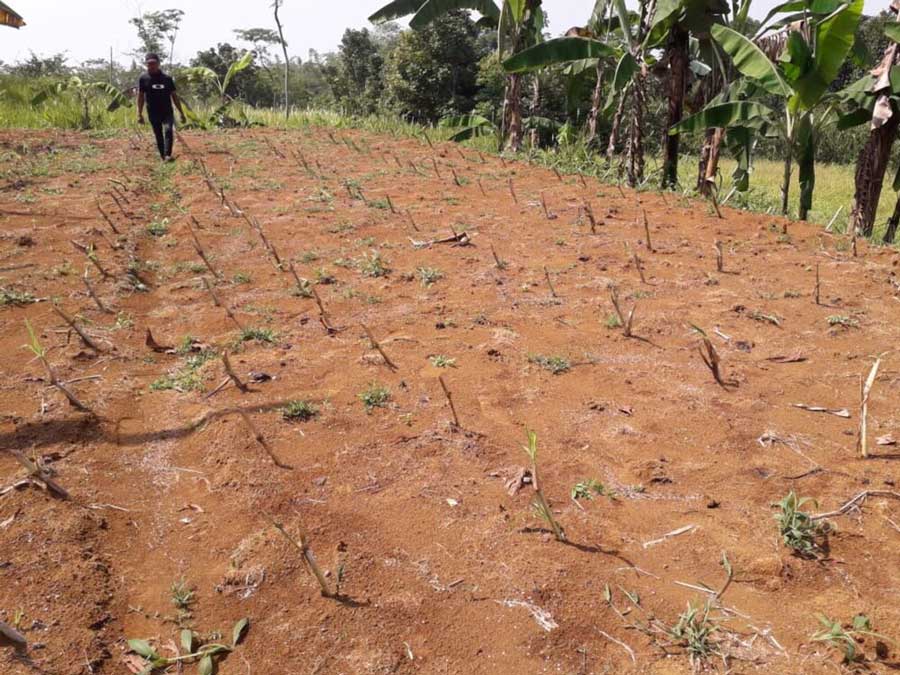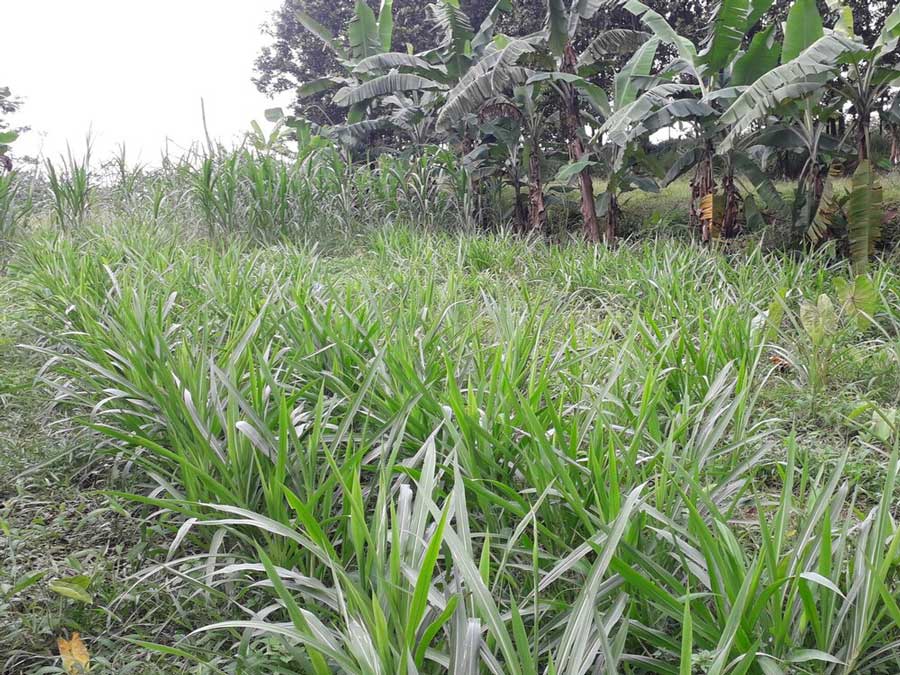Focus farmer: Pak Yunus
Profile of dairy business - July 2019.
“The dairy cattle business provides us with daily income from milk as well as future savings”Ibu Encih
The family dairy business, now managed by Pak Yunus was previously undertaken by both of his parents from 1995 to 2004 in Tajurhalang Village, Cijeruk. The number of cows managed during this time was 13 head, but in 2004 some cattle were sold to build homes for the family and other household purposes. In the following years the number of cows declined due to sudden deaths or sold as additional income for the family.
There was a year when the farm had no cows, and for Pak Yunus to re-build the dairy herd required high family support.
"I can say that in my experience to start a dairy business has some difficulties but it's also easy," said Pak Yunus.
The difficulty deals with the limited capital to establish the farm, however because he had experience managing the farm with his parents this made it technically easier for him.
Pak Yunus joined as a member of the Kania farmer group, and in 2017 there was a Government program for dairy cattle and he gained one pregnant cow to start the dairy business again. In the following year, the dairy cow calved and slowly the herd size grew and the farm currently has three head including one calf, one cow and one heifer.
Together with his mother, Ibu Encih and his second brother, Pak Yunus was able to resume operation of the dairy business. It has been a dream of his to continue dairy farming that was once undertaken by his father, to help support the household with daily needs and savings. He also has a desire to advance his understanding of better livestock practices, which has motivated Pak Yunus to become involved in the IndoDairy Focus Farm activity. The future aspirations of Pak Yunus together with Ibu Encih and brother is to increase the size of the herd from 2 to 15 cows, which used to be the size of the farm when it was operated by his parents.
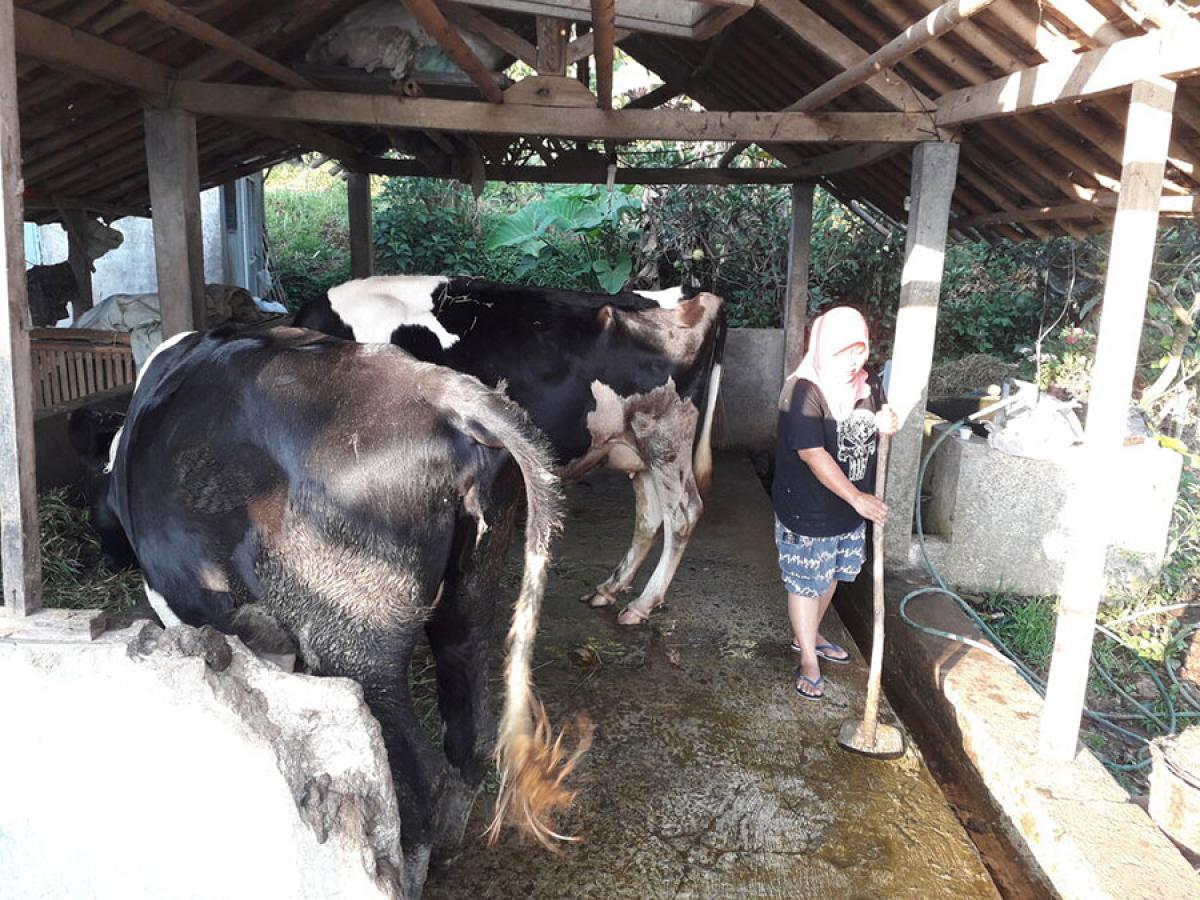
Ibu Encih, mother of Pak Yunus, cleaning the animal house.
- Farm size: 3
- Number of milking cows: 1
- Calves (0-4months): 1
- Heifers: 1
- Average milk production: (litres/day/cow): 11
- Current milk fat: 3.6%
- Current milk protein/total solids: 3.1%
- Milk price/L: Rp. 5,000
- Farmer Group: Kania Group, Cijeruk, Bogor
Together with his mother, Ibu Encih and his second brother, Pak Yunus was able to resume operation of the dairy business. It has been a dream of his to continue dairy farming that was once undertaken by his father, to help support the household with daily needs and savings. He also has a desire to advance his understanding of better livestock practices, which has motivated Pak Yunus to become involved in the IndoDairy Focus Farm activity.
The future aspirations of Pak Yunus together with Ibu Encih and brother is to increase the size of the herd from 2 to 15 cows, which used to be the size of the farm when it was operated by his parents.
Although Pak Yunus was able to gain experience in farming by learning from his father, he has encountered a number of challenges, and the small scale of the farm remains a challenge. In addition, the dairy farm is currently supported by the family ornamental plant business, with the hope to increase the scale of livestock business, as well as capital and farm management skills to improve its operation.
The hope of Pak Yunus and his family following their involvement in the Focus Farm will be to access improved information by sharing knowledge with experienced experts or professionals, as well as other farmers to work on their specific goals over the coming year.
Update - October 2019.
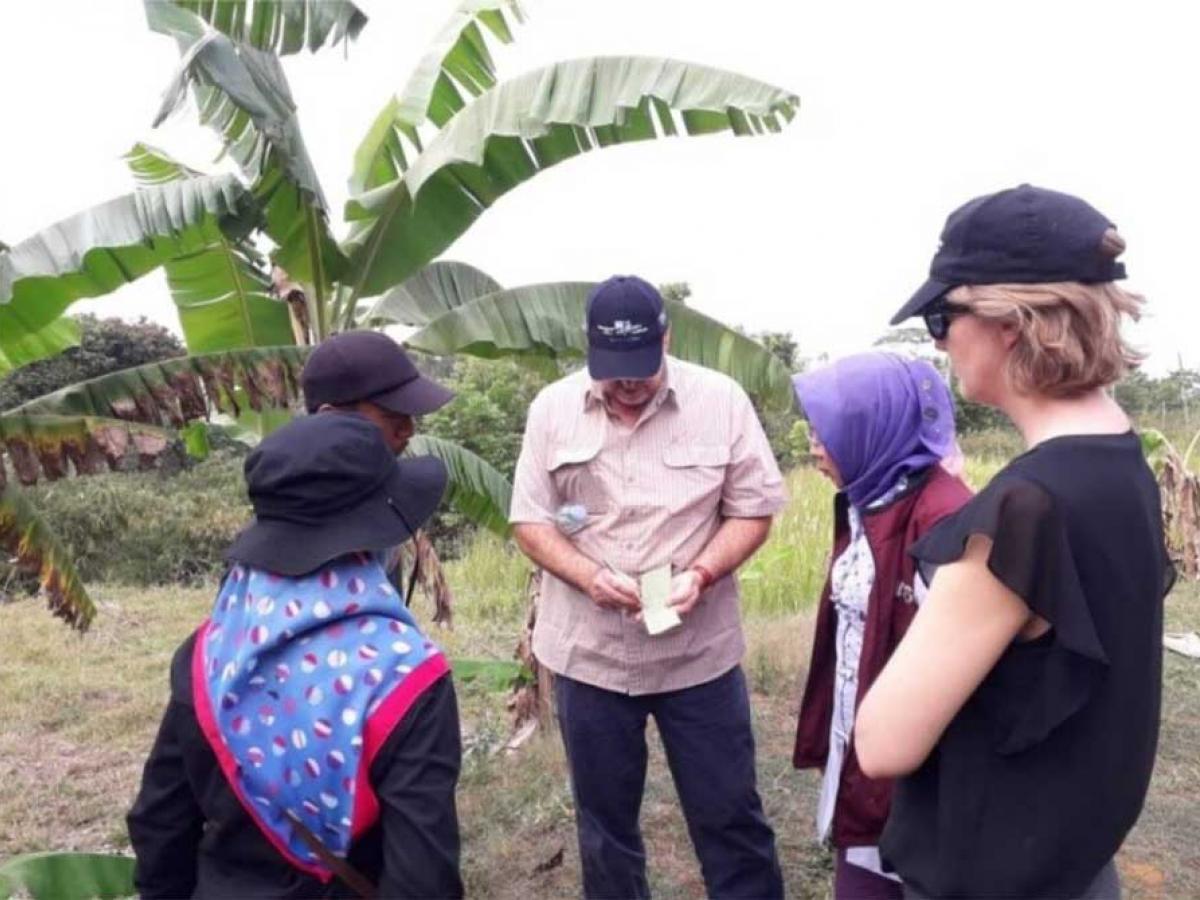
Focus Farm meetings commenced with Pak Yunus on the 23 June 2019 with the IndoDairy team. Two meetings with the support group were held on the 21 August and 5 October 2019 at Pak Yunus's house. The Focus Farm support group consists of advisors and neighbouring farmers who participate in regular meetings at the farm to support the goals of Pak Yunus. The support farmers were chosen by Pak Yunus to provide input and share their experience to help assist during involvement in the IndoDairy Focus Farm.
The goals of Pak Yunus are to:
- Increase the dairy herd from 1 cow to 15 cows over the next 10 years and increase the profit of dairy business to 70% (meanwhile decreasing the ornamental plant business to 30%) (longer term goal) and;
- Increase milk production to over 15 litres/day (shorter term).
Soil and feed samples were carried out for Pak Yunus to help identify how to best improve feed and milk production on the farm. Soil samples were taken from three blocks of land owned by his family. Feed samples were also taken from the forage and concentrate. The results of the soil analysis were discussed at the second meeting.
The results showed that the organic matter (carbon) as well as phosphorus and potassium were very low. The paddocks sampled had a low ph of 4.2, 4.4 and 4.7, indicating the soils are very acidic. Analysis of the concentrates showed they had a low protein content of only 9-10% crude protein.
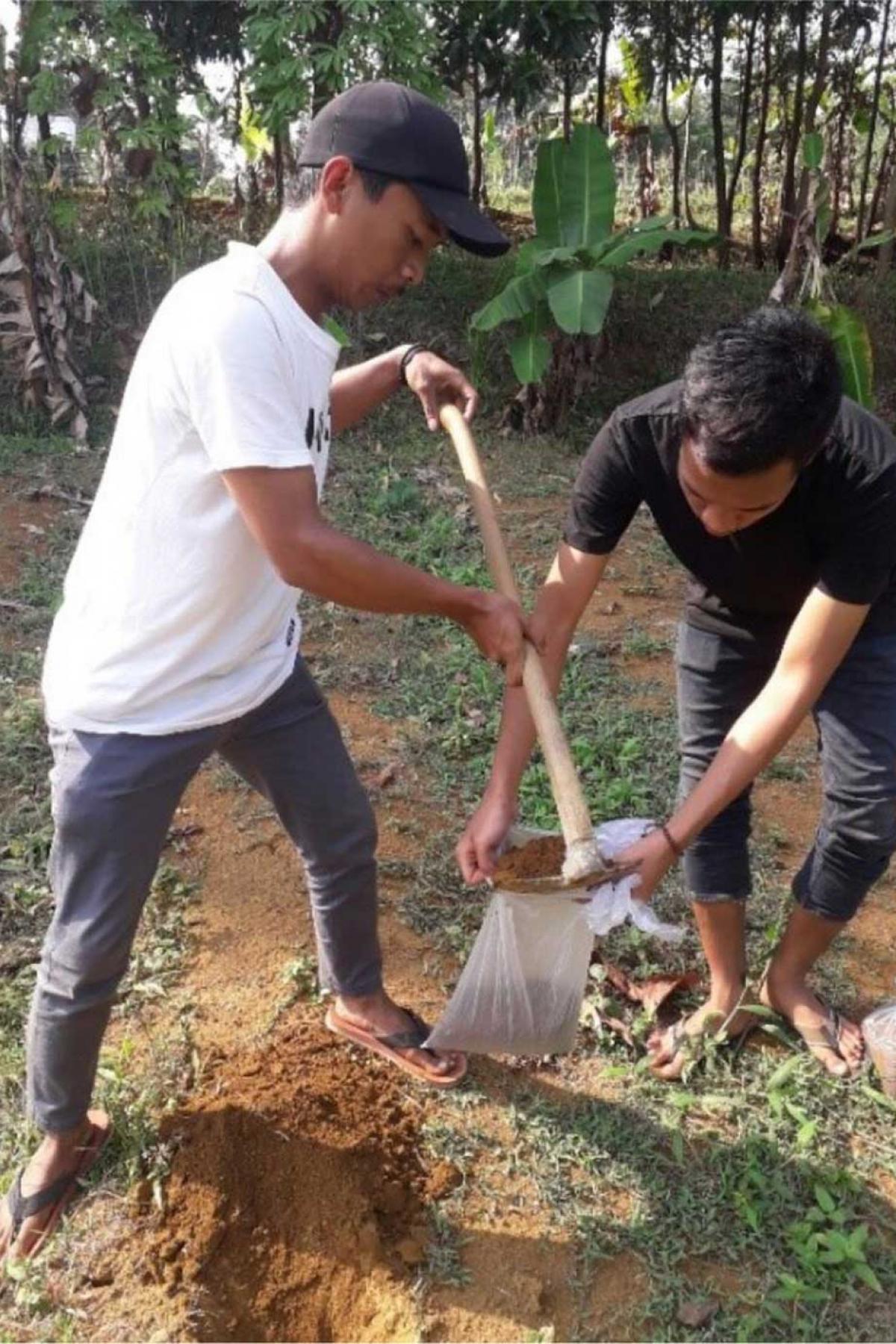
With this information the recommendations of the Focus Farm support group are to:
- Improve the soil nutrients of nitrogen, phosphorus and potassium by applying compost and inorganic fertilisers, as well increase the soil pH by applying lime (calcium carbonate).
- Improve the diet of the dairy cow by adding additional high quality concentrate and molasses to improve energy and protein in the diet to assist with reproductive health.
Pak Yunus will renovate one block of land (block 2) which is 400 square meters and will be sown with odot, elephant grass and legumes for forage production. The land will be prepared with compost and lime, as well as inorganic fertiliser of superphosphate and potassium sulphate. Forages will be sown at the end of October with commencement of the wet season. Forage production will be monitored and discussed during the next Focus Farm meeting at the end of November.
Update - February 2020
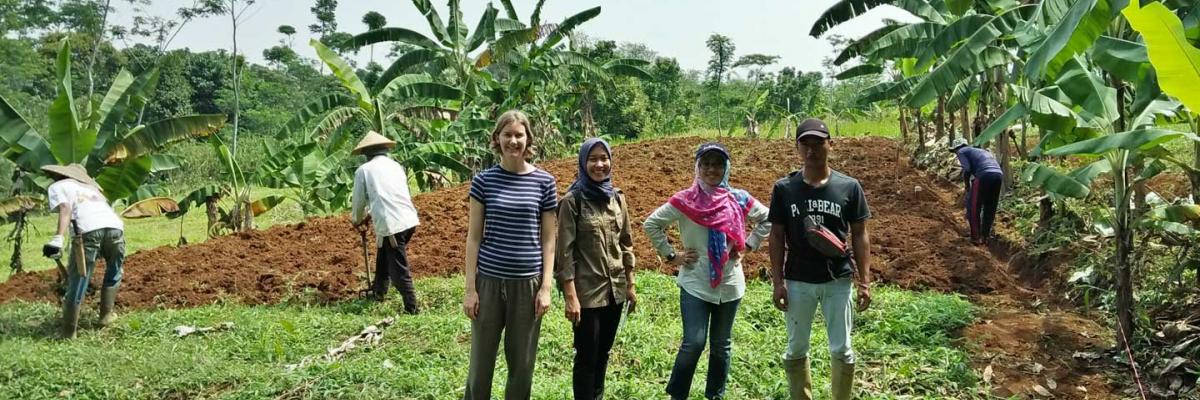
Tilling the land and adding manure at Pak Yunus's forage block ready to plant odot and elephant grass.
Pak Yunus has now been part of the IndoDairy Focus Farm journey for over six months. As of February 2020 cow numbers on the farm remain the same but milk production increased when the cow was supplemented with soybean meal and molasses as part of a feeding trial to increase protein in the diet and overall dry matter intake.
Odot and elephant grass cutting shoots after planting.
Odot plants with good yields at 71 days
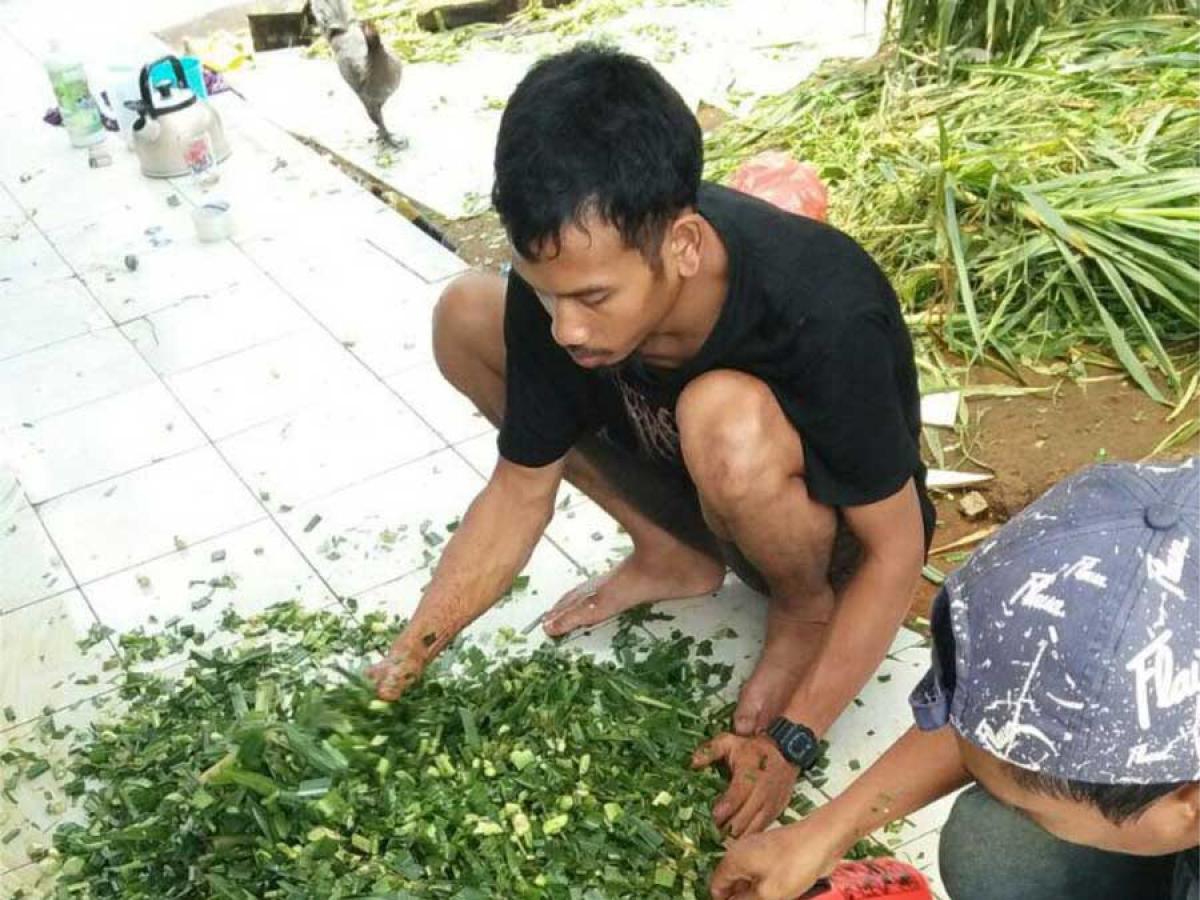
Pak Nardi (support farmer) helps Pak Yunus to make odot silage.
Planting of odot and elephant grass was completed on 11 November 2019 and harvested on 6 February 2020 (86 days of growth). The forage plot was divided into two sections and half was treated with urea at the rate of 100kg/ha to observe a nitrogen response. Odot will also be analysed for protein, and NDF.
Odot was harvested then chopped to make silage by Pak Yunus and supported by Pak Nardi from the Focus Farm support group. Pak Nardi had never made silage before and is now motivated to trial silage on his own farm after learning the practices through the Focus Farm with Pak Yunus. This shows the benefits of the activities of the Focus Farm for the support group and flow on impacts in the community.
Update - April 2020.
The sixth and final Focus Farm meeting was held on 9 March 2020 for Pak Yunus. The activities carried out during the year on the farm were reviewed, including the result of the forage trials and silage; and how the use of home grown forage can contribute to his longer term goal of increasing to 15 cows.
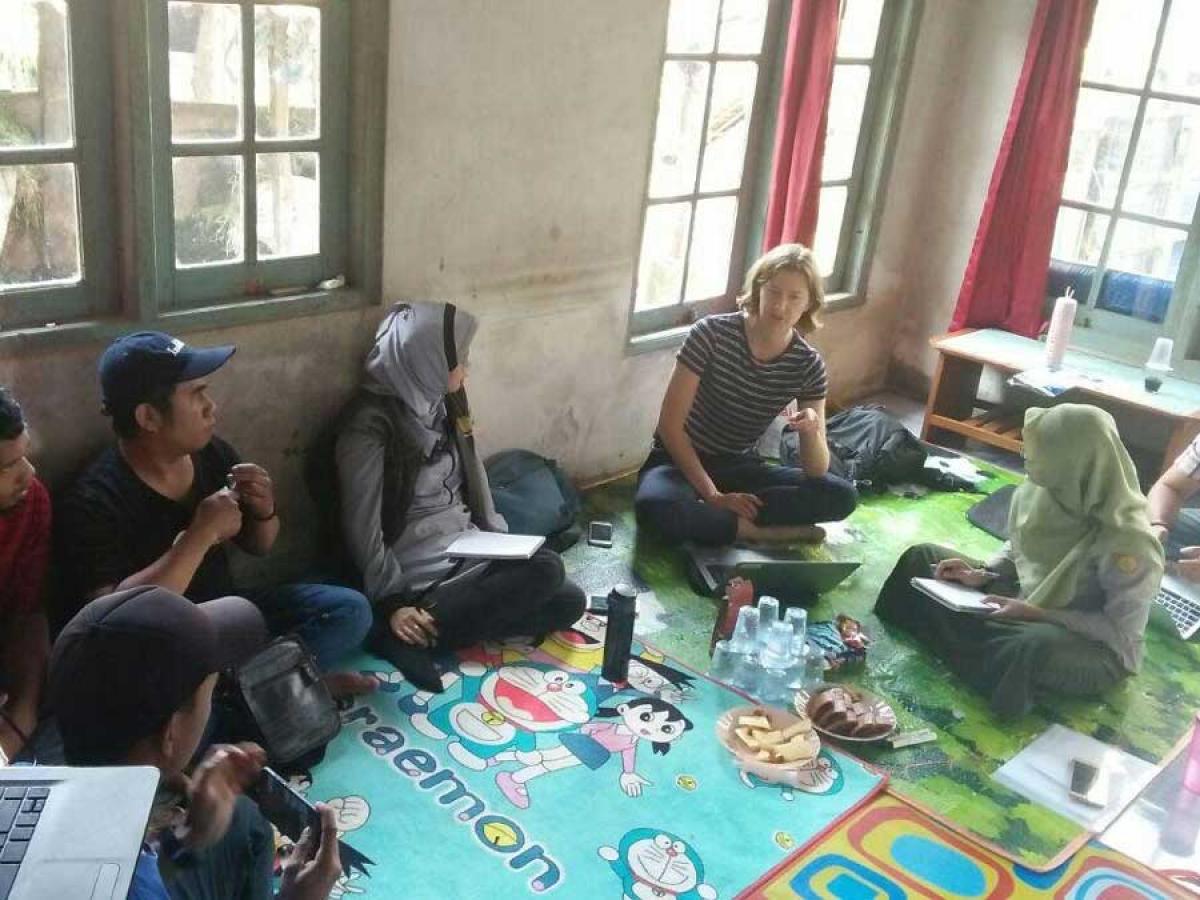
The discussion at Pak Yunus's house during the last focus farm meeting.
To fulfil the forage needs on the farm, Pak Yunus has usually sourced grass on the roadside or from the mountain, which are of poorer quality. Occasionally, he has been given access to failed rice or corn crops after harvest which has been beneficial. Through the Focus Farm Pak Yunus has been able to trial growing his own forages such as odot, elephant grass and biograss grass. After seeing the value of growing forage to feed to his cow he would like to continue to crop the land with less of a reliance on roadside grass. Simple observations were made to monitor the growth of the forage plots, where some of the blocks were treated with urea. The odot performed well, and at harvest time (86 days after cuttings planted) odot samples were taken (mostly the leaf) and analysed for protein, Neutral Detergent Fibre (NDF) and Acid Detergent Fibre (ADF). The results showed that the odot sample with urea had a slightly higher crude protein content of 16.44%.
| Type of forage | Protein % | NDF % | ADF % |
|---|---|---|---|
| Odot with an application of urea | 16.44 | 56.36 | 33.64 |
| Odot without urea | 16.30 | 57.17 | 34.73 |
Table 1. Forage analysis results for odot for two samples i) odot with urea applied (100kg/ha) and ii) odot without urea applied.
Supplementary feeding of soybean meal and molasses was trialled with the lactating cow for two months. The addition of this feed aimed to increase milk production and improve the body condition of the cow, and also help the cow to come into oestrous because she had been unsuccessfully submitted to AI three times previously. Over the two months the cow's condition improved and milk production increased from about 10 litres/day in July 2019 to 14-15 litres/day in November - December 2019. After the positive milk response Pak Yunus hopes to continue maximising milk production at 15 litres per day if possible over the longer term.
The cow increased body condition from approximately 480 kg to 530 kg (using a weight tape) and then by the last meeting the cow was 3-4 months pregnant, after being successfully submitted to AI in late November 2019. During the Focus Farm activities, monthly records were kept to analyse profit by collecting milk income and costs incurred. The average profit per litre over the 8 month period was 1,459 Rp/L and there was an increase at the start from 1,271 Rp/L to 1,468 Rp/L in February 2020.
| Months | Total milk production (litres) | Litres / cow / day | Milk income / L | Cost of production / litre (RP/L) | Net proft / month (Rp) | Net prpfit (Rp/L) |
|---|---|---|---|---|---|---|
| July | 299 | 10 | 5,576 | 4,305 | 379,600 | 1,271 |
| August | 316 | 10 | 5,630 | 4,620 | 319,000 | 1,009 |
| September | 294 | 10 | 5,613 | 4,540 | 197,500 | 673 |
| October | 397 | 13 | 5,895 | 3,846 | 812,500 | 2,049 |
| November | 448 | 15 | 5,000 | 4,014 | 441,950 | 986 |
| December | 423 | 14 | 6,104 | 3,717 | 1,009,500 | 3,387 |
| January | 401 | 13 | 5,000 | 3,177 | 731,000 | 1,823 |
| February | 360.7 | 12 | 5,000 | 3,532 | 529,500 | 1,468 |
| Average | 367 | 12 | 5,477 | 4,019 | 552,619 | 1,459 |
Note: the costs for soybean and molasses were included in November and December
Table 2. Analysis of farm business management after recording income and costs on the farm for one lactating cow from July 2019 – February 2020.
Working through the business analysis each month has helped Pak Yunus understand not only about the costs incurred but also the impact that his efforts have had on his profit over the past few months.
Silage was trialled using odot and also adding probiotics made by LIPI (Indonesian Institute of Science) called BIORESIK and molasses. For this trial, silage was made in a small batch of 10 kg of odot, 20 mL of probiotics and 200 mL of molasses. The forage for silage was chopped, dried (for 2 days because of the rainy season) and stored for 21 days to allow the fermentation process to take place. The silage was analysed for protein, fibre (NDF) and Volatile Fatty Acids (VFA) content.
| Silage samples | Crude protein % | NDF % |
|---|---|---|
| Odot urea silage (2 days dried) | 13.06 | 49.09 |
| Odot without urea silage (2 days dried) | 14.50 | 47.37 |
Table 3. Results of the analysis for odot with a comparison between the forage with urea applied to without urea.
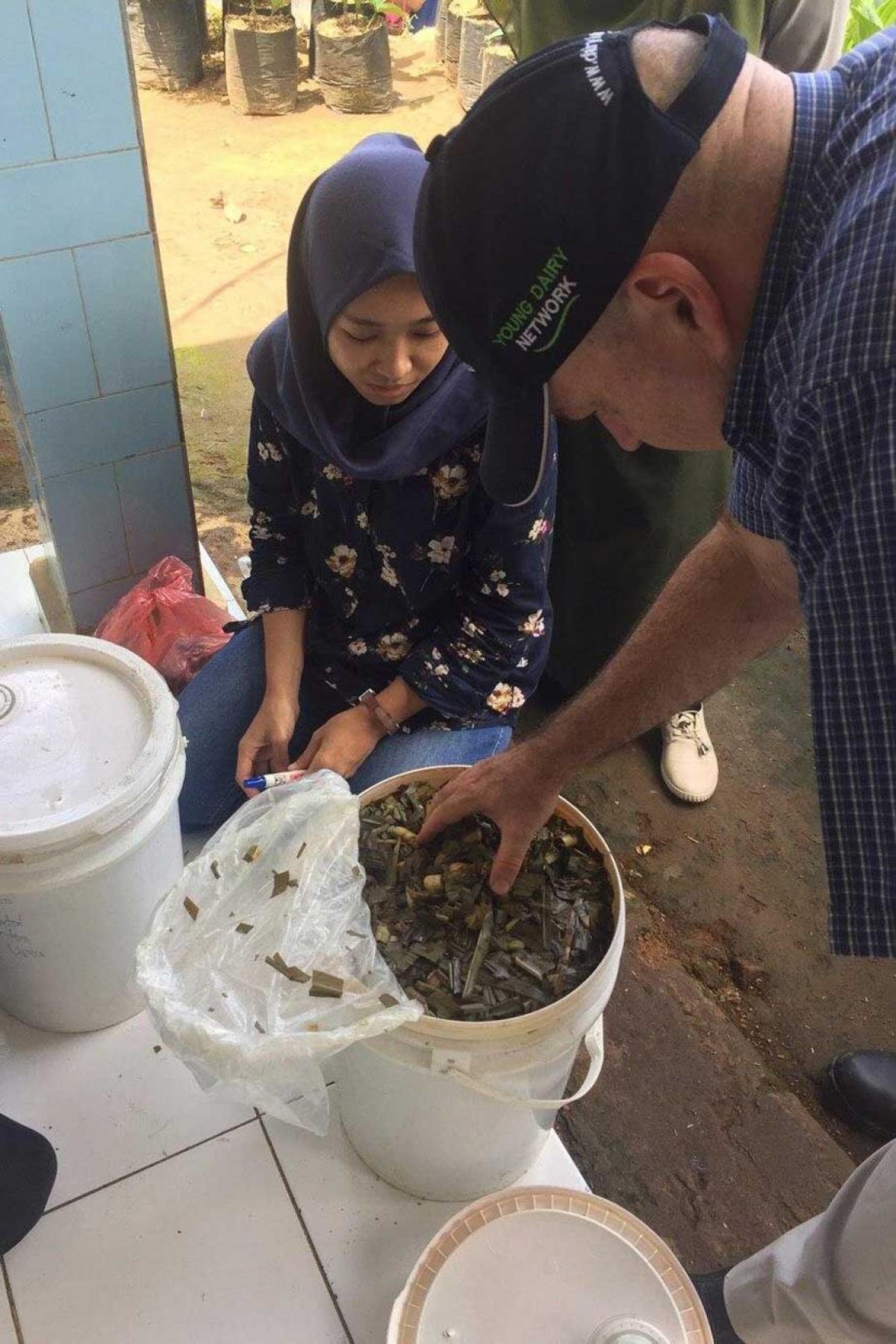
Brad Granzin and Attin (Focus Farm facilitator) checking the condition of the odot silage after storage for 21 days.
The lab results of silage samples showed relative good protein levels compared to the silage made from elephant grass and biograss, and was found to be more digestible (lower NDF levels). Surprisingly though, the protein was lower in the sample with forage that had urea applied which is not consistent with the fresh samples. The volatile fatty acids were at acceptable levels for acetate and butyrate, however further analysis would be needed for conclusive results as the pH result was incorrect.
When the silage was opened it was observed that the forage could have been compacted more in the bucket (which is a challenge with tropical forage) to ensure all air is removed for optimal fermentation, which will improve the quality in future.
Overall, for Pak Yunus, the Focus Farm activity helped him obtain the latest information to improve his business. Pak Yunus said
"The involvement in IndoDairy helped me become aware of things that I didn't know about. Feeding soybean meal and molasses made me aware of how to improve cow condition for better reproduction, and also the benefits of giving forage or supplementary feed. Hopefully in the future I can pay more attention to feeding the cow better such as providing soybean meal and molasses. Thank you so much IndoDairy and the team – it has taught me a lot about the current science.”

